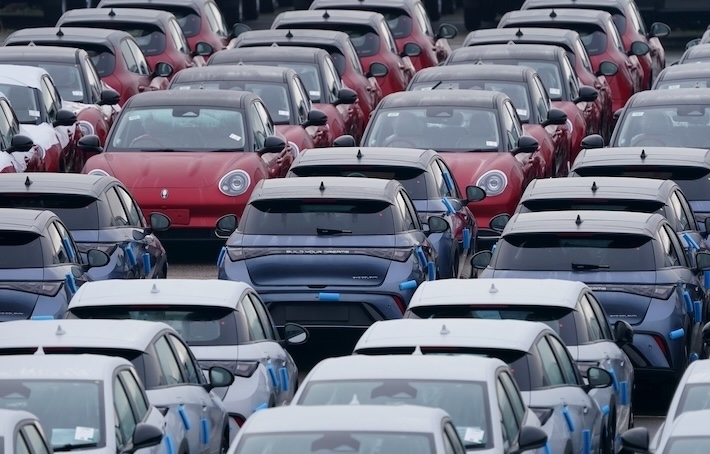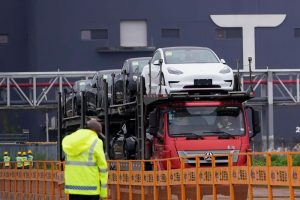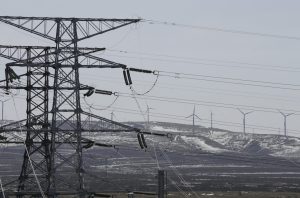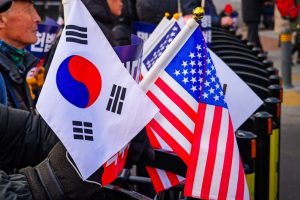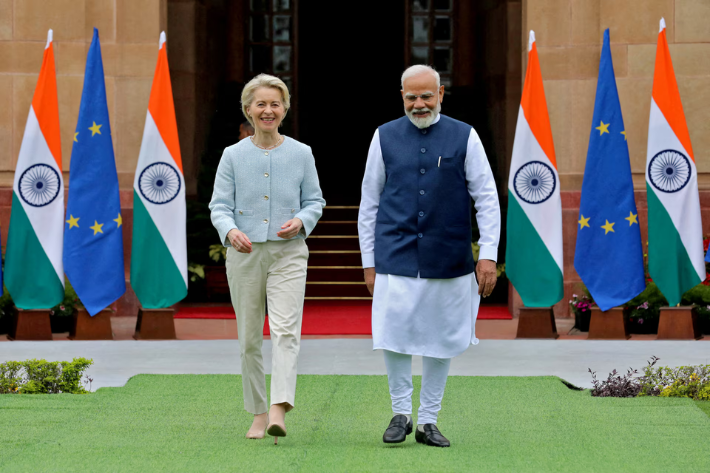A decision by Chinese policymakers this month to not include electric vehicles among the strategic industries for the country’s latest five-year development plan is a clear signal that Beijing is about to leave behind an era of lucrative subsidies for the sector, experts say.
China published its five-year development plan for 2026-2030 on Tuesday and for the first time in 15 years, new energy vehicles (NEVs) were not included in its list of strategic emerging industries. NEVs comprise EVs, plug-in hybrids, and fuel-cell vehicles.
Analysts say the move is evidence that Beijing considers the industry to be mature and no longer requires the same level of financial support, leaving its development up to market forces.
Also on AF: Trump to Discuss Nvidia’s Top Chip With Xi, as Market Cap Soars
“It’s an official acknowledgement that electric vehicles no longer need prioritised policies. Electric vehicle subsidies will fade,” Dan Wang, China director at consultancy Eurasia Group, said.
“China already dominates in EV-related tech and batteries, so there is no point prioritizing it. It doesn’t mean the government will require capacity to be cut, but the market will play a bigger role in deciding who survives,” she said.
Beijing kicked off its EV push in 2009, designating the industry as a strategic and “new productive force” in the last three five-year plans. That encouraged Chinese authorities to pour in billions of dollars worth of subsidies to encourage automakers to produce EVs and consumers to buy them.
The support gave rise to a supply chain that made China the world’s largest NEV market. Last year, NEVs accounted for over 50% of total auto sales in China, more than 10 years ahead of the goal policymakers had initially set.
But that rapid growth and support has also resulted in China having domestic brands making close to double the cars it can sell because the industry is striving to hit production targets influenced by government policy, instead of consumer demand.
According to research firm Jato Dynamics, 93 of 169 automakers operating in China have market shares below 0.1%.
“From the country’s point of view, it is no longer necessary to pay too much attention (to NEVs), or it may lead to greater overcapacity,” said Tu Xinquan, Dean and Professor of the China Institute for WTO Studies at the University of International Business and Economics.
While NEVs were excluded from the latest national plan, he expected ministries such as China’s state planner and industry ministry to announce more specific plans to guide its future trajectory.
Focus on innovation
Experts say the omission should not be seen as a sign that the EV industry has fallen out of favour in Beijing. Instead, it reflects a strategic decision to allocate resources to other technologies where China seeks to enhance its capabilities, especially in light of global trade and security tensions, they say.
The five-year plan, published by the official Xinhua News Agency on Tuesday, prioritises quantum technology, bio-manufacturing, hydrogen energy, and nuclear fusion as new drivers of economic growth.
All those industries are driven by tech innovation, an area Beijing has turned its focus on in light of trade wars with the West and decisions by countries like the United States to choke off supplies of advanced technologies like semiconductors to Beijing.
Chinese President Xi Jinping has maintained that the country’s goal remains to become self-sufficient in critical technologies and cut any reliance on foreign nations.
In July, S&P Global reported that China’s local governments were now planning to spend a whopping $2 trillion to upgrade key tech industries. Some of that funding will also go into the EV sector, but with the purpose of developing solid-state batteries, vehicle intelligence and autonomous driving technologies, experts say.
Cui Dongshu, secretary-general of China’s Passenger Car Association, said Chinese policymakers will now likely press EV makers to focus more on delivering more innovative products and curb production of lower quality vehicles.
Automakers would need to build sufficiently prominent core strengths to gain a foothold in the Chinese market, Shaochen Wang, a research analyst at Counterpoint, said.
“For instance, brands like BYD and Leapmotor have strengthened their cost advantages by enhancing supply chain integration capabilities and launched more cost-effective products. Meanwhile, Xiaomi and brands under HIMA (Huawei Intelligent Mobility Alliance) have attracted consumers with their strong brand influence and leading ‘intelligent’ features,” he said.
Focus on market forces
To be sure, Chinese policymakers have for years said that their ultimate intention was for the industry to stand on its own two feet and has, in parallel, been gradually ending years of major subsidies and tax breaks for the NEV sector.
At the end of 2022 it ended a national purchase subsidy scheme for EV consumers and intends to phase out purchase tax rebates by 2027, although some Chinese auto industry associations are lobbying for the latter to be done at a gentler pace.
A Chinese policy adviser, who spoke on the condition of anonymity, said EVs not being classified as an emerging strategic industry “is not to say they’re not important — they absolutely are. Just look at our exports, the source of profits for the entire auto sector, the boost to the industrial chain, and our global leadership. NEVs are undoubtedly important.”
But this official shift means that automakers need to face up to the reality that their futures will likely be decided by market competition. In the first half of this year, 11 out of 17 listed Chinese automakers were profitable.
CPCA’s Cui said the plan indicated that policymakers would take more targeted measures versus the previous broad approach, to wean the industry off government support.
Booming exports
The potential phasing out of subsidies at home will also come at a time when intense competition and shrinking demand at home have pushed top Chinese EV-makers to develop markets and supply chains in foreign markets.
Last year, Chinese EV firms invested more abroad than at home for the first time, according to data from Rhodium Group. Meanwhile, the value of Chinese domestic investment in the EV value chain plummeted from $94 billion in 2022 – a peak – to just $15 billion last year, the data showed.
Carmakers like BYD, Geely and Great Wall Motors all have plans to build new factories in Europe, Asia, Latin America, the Middle East and Africa. Fewer subsidies at home will only support that push, given that most countries have imposed high tariffs on imported Chinese EVs because their subsidy-driven low costs are a huge threat to carmakers in other countries.
That pressure is especially significant in Europe — a region where Chinese EV firms are currently witnessing explosive growth. According to data from the European Automobile Manufacturers Association, Chinese EV giant BYD saw a 398% increase in vehicle registrations across Europe last month. In the same month, the United Kingdom emerged as the biggest offshore market for BYD with an 880% surge in sales.
BYD — which has won over prospective buyers by offering top technology and quality even in its cheapest models — has also benefitted from growing consumer opposition to Elon Musk-led Tesla. The US carmaker was once the top EV-seller in the region, but consumers have increasingly said that Musk’s polarising political actions have put them off buying a Tesla. In September, Tesla’s EV sales in the EU fell by 18%. That was after a much steeper 42% fall in the carmaker’s sales in August.
Meanwhile, Chinese EV-makers are also potentially poised to benefit from US President Donald Trump’s global tariff wars. Canada, for instance, is seeking more positive bilateral relations amid increasingly antagonistic trade ties with Washington.
Early this week, The Wire China reported that Canadian President Mark Carney was considering dropping the 100% tariffs the country imposed on imports of Chinese EVs last year in line with US policies.
Carney said this week he was hoping to ‘reset’ Canadian ties with China when he meets Xi in South Korea in coming days.
- Reuters, with additional inputs from Vishakha Saxena
Also read:
Chinese EV Firms Invest More Abroad Than At Home For First Time
China Is Full Of New Car Graveyards
Beijing Says it Will Rein in EV Sector’s ‘Irrational’ Competition
Local Officials in China Backed Export of ‘Zero-Mileage Used Cars’
China’s Top Paper Seeks End to Sale of ‘Zero-Mileage Used Cars’
China Plays Rare Earths Card in EV Tariff Negotiations With EU
Cargo Ship Carrying 3,000 Cars Ablaze Off Alaska, EV Fire Blamed
China Carmakers Told to Explain Sales of ‘Zero-Mileage Used Cars’
China’s Intense EV Price War Taking a Toll on Car Dealers
BYD’s Big Gains Give Chinese EV Rivals a Giant Headache




